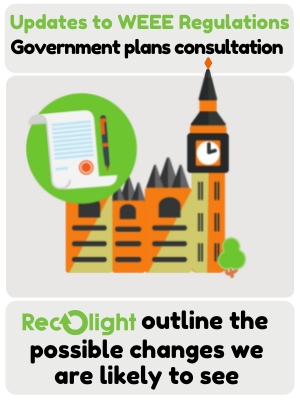Big changes to the WEEE Regulations
 The Government is planning to consult on updates to the WEEE Regulations later this year. They are likely to result in major changes to the system. There will be a strong focus on increasing collections, and encouraging more circular behaviour in the WEEE system.
The Government is planning to consult on updates to the WEEE Regulations later this year. They are likely to result in major changes to the system. There will be a strong focus on increasing collections, and encouraging more circular behaviour in the WEEE system.
Recolight outline the possible changes we are likely to see….
Lighting producers and business end users
- Making online marketplaces and fulfilment houses financially responsible for the compliance of product sold via their platforms. This will have a huge impact on tackling the WEEE avoidance that is facilitated by some of the UK’s largest online marketplaces.
- Recycling of business WEEE: The current system is challenging to navigate, allowing business waste luminaires to be recycled as scrap metal, rather than as WEEE. This results in unlawful processing of hazardous materials. Simplifications will allow holders of business WEEE to access free of charge, producer-financed collection and recycling.
- Implementation of modulated fees: A mechanism by which environmentally good products are charged lower WEEE fees. A possible example could be the inclusion of a minimum proportion of plastic from recycled sources in products.
Easier WEEE recycling for consumers
It seems likely that the Government will be consulting on two key changes to kerb-side services, financed by producers and distributors:
- Make finance available to Local Authorities, or other operators, for a kerb-side collection system for small WEEE.
- Require distributors to collect large waste appliances free of charge, if made available when delivering new large appliances.
These two changes would make it far easier for consumers to do the right thing. For lamps, given their fragility, this could present challenges, requiring an alternative approach. That might be a requirement for the establishment of additional collection points for consumers.
Enforcement of the WEEE Regulations
It is hoped that new proposals for stronger enforcement will be included, with Environment Agencies legally required to inform producers where action is being taken against their chosen scheme. Enforcement powers given to the Environment Agencies in the current WEEE regulations are limited. There have been significant enforcement failures – for example, a WEEE scheme avoided over £2m in costs, and yet was only fined £50,000.
WEEE Central Body
The changes are likely to require the establishment of a central body to oversee certain functions. Such a body would probably have a role in collecting fees to finance kerb-side collections, and then distributing them according to an agreed formula. The central body could also take responsibility for certain functions that are currently handled by other organisations. For example, it could have a role in the setting and collection of compliance fees, modulated fees, and take responsibility for consumer and business communications and awareness programmes.
Encouraging Reuse
The consultation may also include proposals to incentivise producers and WEEE Compliance Schemes to use re-use evidence to meet their targets. This could be by giving reuse evidence greater value than recycling evidence.
Consultation and Timing
Defra plans to launch the consultation later this year with for implementation from January 2024.
Recolight will encourage lighting producers to respond, to ensure that the Government gets a clear view on the requirements of the lighting sector.

